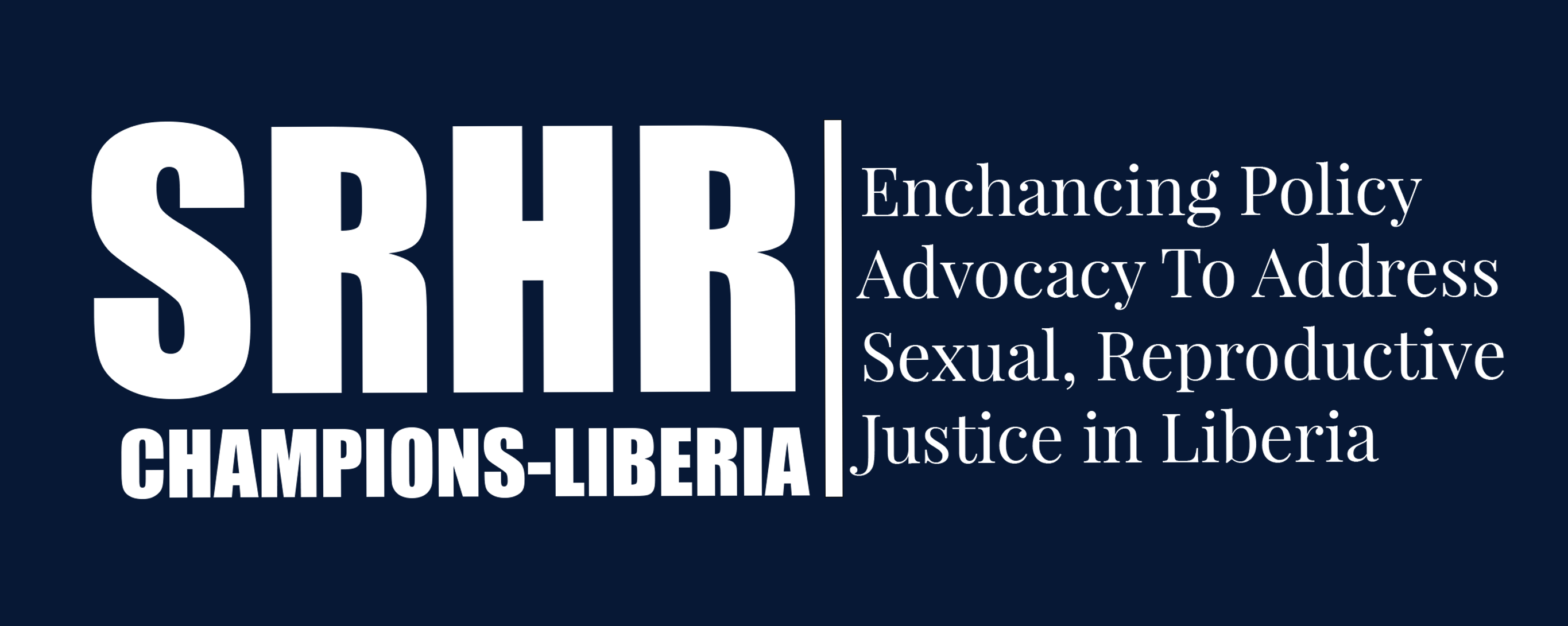The Sexual Reproductive Health and Rights Champions Liberia (SRHRCL) is a legally registered organization that promotes strategic policy advocacy through community-led awareness, research, and capacity strengthening. Our interventions are designed to engage policymakers to promote evidence-based decision-making towards advancing sexual and reproductive health and rights (SRHR) in Liberia. We focus on empowering communities, particularly women, girls, and marginalized groups, to demand accountability and influence policies that protect their health and dignity. By bridging grassroots voices with national and regional policy platforms, SRHRCL ensures that legislative and programmatic frameworks reflect the lived realities of marginalized populations. Through partnerships, advocacy campaigns, and participatory research, we aim to address systemic barriers to SRHR, including gender inequality, harmful practices, and limited access to quality health services. Ultimately, our goal is to foster an enabling environment where every Liberian, regardless of gender, age, or background, can enjoy their fundamental rights to health, choice, and bodily autonomy
Our Generic Focus:
2.1 Mission
Our mission is to improve the quality of reproductive health and rights services through policy advocacy, research, and capacity strengthening.
2.2 Aim
Our aim is to strengthen grassroots organizations in evidence-based policy engagement that advances reproductive justice for key populations, vulnerable women, and other marginalized groups, with active participation from youth and other community stakeholders.
5 Working modalities
SRHR Champions Liberia achieves its program outcomes through partnerships, grants, sub-grants, and self-funded projects. Our strategic approach actively involves key populations, local and traditional stakeholders, and specific target groups who influence or have interest in policy-making and implementation processes. We align our work with the Government’s National Development Agenda, international development commitments, and global gender policies that promote SRHR services using a human rights-based approach. In addition, we collaborate with INGOs, local governance bodies, professional development organizations, research institutions, healthcare providers, teaching institutions, young professional groups, and corporate partners to ensure effective and inclusive program implementation.
Our program implementation process follows these clear steps:
- Approval: Programs and activities are approved by our Executive Director and donors.
- Inception Meetings: All relevant stakeholders and partners are informed and engaged to communicate program objectives.
- Coordination: Continuous communication with local stakeholders and partners ensures alignment and smooth execution.
- Implementation: Programs are carried out in the targeted areas after approvals and coordination.
- Evaluation and Reporting: Feedback is collected, evaluations are conducted, and comprehensive reporting is completed.
- Closure: Programs are formally concluded after all reporting and evaluations are finalized.
This structured approach ensures accountability, transparency, and active participation of all stakeholders while achieving the intended outcomes of SRHR Champions Liberia’s programs

.
Coordination: At the policy level, SRHR Champions is working closely with the Liberian Senate committee chair on Health, CHI, and Multi-stakeholders for the passage of the Draft Public Health Bill. In the spirit of effective advocacy, regular policy meetings are usually conducted with public entities and policy actors to identify key stakeholders and build synergy.
Local government bodies and health authorities: SRHR Champions has been coordinating with central and local government bodies and major stakeholder in Public Health Management such as municipalities, Ministry of Health, the National Public Health Institute of Liberia and the Nurses Association of Liberia. These authorities are informed about programs and activities and often solicit their involvement in planning and executing project-related activities. Likewise, different health institutions are also involved in health related programs.
6 Geographical coverage the SRHR Champions Liberia is legally registered in the Republic of Liberia under the Liberian government and authorized by the Ministry of Foreign Affairs and the Liberia Business Registry to operate its programs in all fifteen counties in Liberia. We work across Liberia to implement different research projects, capacity building and advocacy engagement. The direct implementation of this organization is also programme-based activity, operational research, capacity building . SRHR champions has working partners in Bong County, Montserrado, Lofa, Nimba and Margibi. These partners work in the health and human rights fields. To implement any programs in the districts, SRHR Champions has the capacity to engage and mobilize individuals as well as the organizational networks to implement the programs. Many programs have been conducted in similar manner in the past and hence we would continue similar modality in implementing activities across different districts and counties.
9 Working Partners
Ministry of Gender Children and Social Protection, SRHR Technical working groups, the Senate Committee on Health, Rural Women Network, Ministry of Internal Affairs, RFSU, CHI, Women NGO Secretariat of Liberia, Paramount Young Women Initiative, Front Page Africa, Focus Community Health, National Traditional Council of Liberia Head, Chief Zanzan Karwa, Media institutions ( Kool FM, Women TV, ECOWAS Radio and FrontPage Africa), Members from the Liberia National Physician Assistants Association, Liberia Lab Association, Liberia X-ray Technician Association, Liberia Operating Room Technician Association, Liberia, Nurses Association, Liberia Midwifery Association, Liberia Private health facilities Association, Pharmacist Association of Liberia, Liberia, Respiratory therapist Association, Ministry of Health, Liberia Medical and Dental Council, Public Health Institute Liberia, United Methodist University medical students, University of Liberia, African Methodist, University, Adventist University of West Africa and counties health team officers.
11 Leadership
Titus B. Pakalah Founder/ Executive Director
Zaiah Flumo – M&E
Betty Sia Sessay Communication Manager
Betty Love Sarpleh Advocacy Manager
Isaac Barcon Program Manager
Adihmun Kanneh Communication Officer
Zenkins Mulbah Finance Manager
Tometta Elliot -Advocacy officer
9 Working Partners
Ministry of Gender Children and Social Protection, Senate Committee on Health, Rural Women Network,
Ministry of Internal Affairs, Paramount Young Women Initiative, Front Page Africa, Focus Community
Health, National Traditional Council of Liberia Head, Chief Zanzan Karwa, Media institutions ( Kool
FM, Women TV, ECOWAS Radio and FrontPage Africa), Members from the Liberia National Physician
Assistants Association, Liberia Lab Association, Liberia X-ray Technician Association, Liberia Operating
Room Technician Association, Liberia, Nurses Association, Liberia Midwifery Association, Liberia
Private Health Facilities Association, Pharmacist Association of Liberia, Liberia, Respiratory therapist
Association, Ministry of Health, Liberia Medical and Dental Council, Public Health Institute Liberia,
United Methodist University medical students, University of Liberia, African Methodist, University, Adventist University of West Africa and counties health team officers.
